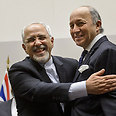

The technical talks were set to begin at 3:00 pm in the Swiss city, Iran's deputy foreign minister and lead negotiator Abbas Araqchi, who is not personally taking part in the expert-level negotiations, told Iranian state television.
Related stories:
- Despite Obama call, senators promote Iran sanctions
- Iran official says final nuclear deal is possible
- Iran FM: We will not give up the reactor in Arak
In an interview with the Wall Street Journal, the French foreign minister said: "We have to implement honestly the first phase, and then my main concern is the second phase. It is unclear if the Iranians will accept to definitively abandon any capacity of getting a weapon or only agree to interrupt the nuclear program."
Fabius further told the Wall Street Journal that Western powers need to focus their efforts on how to deprive Iran of "breakout capacity," the ability to restart a bomb-making program from dormant nuclear sites and make a quick dash to a weapon before world powers can react.
Russian President Vladimir Putin praised the US role in forging an interim deal to ease concerns about Iran's nuclear program but said he hoped the blacklisting of additional Iranian companies under existing sanctions would not undermine progress toward a comprehensive agreement.
"As for sanctions, I am certain that this is a counterproductive decision," Putin told a news conference. "I hope ... movements in this direction will not be a barrier to all of us moving forward toward a solution to the Iranian nuclear problem."
Experts held four days of talks in Vienna last week, but the Iranians walked out after Washington expanded its sanctions blacklist against Tehran.
Tehran was prepared to continue the talks after EU foreign policy chief Catherine Ashton "made the assurance that the world powers, particularly the United States, will continue the talks in goodwill...and that they are serious about implementing the deal," Araqchi told Iran's state broadcaster on Wednesday.
Under the landmark deal struck in Geneva on November 24, Iran agreed to roll back parts of its nuclear program for six months in exchange for modest sanctions relief and a promise by Western powers not to impose new sanctions.
But French Foreign Minister Laurent Fabius, one of the key players in the negotiations with Tehran, cast doubt Thursday on the chances of a final nuclear deal.
"It is unclear if the Iranians will accept to definitively abandon any capacity of getting a weapon or only agree to interrupt the nuclear program," he told the Wall Street Journal.
"What is at stake is to ensure that there is no breakout capacity," Fabius said, referring to Iran's possible ability to relaunch a weapons program from dormant sites.
During the six-month nuclear freeze, which has not yet begun, Iran and world powers aim to hammer out a long-term comprehensive accord to decisively end the standoff over Iran's contested nuclear program, after a decade of failed attempts and rising tensions.
Iran denies wanting nuclear weapons but many in the international community suspect otherwise, and neither Israel - widely considered to be the Middle East's sole if undeclared nuclear-armed state - nor Washington have ruled out military action.
The fresh round of negotiations, being held at an undisclosed venue in Geneva, is scheduled to last through Friday, but Araqchi said talks could be extended into the weekend.
He told Iran's state broadcaster that the head of his ministry's political and international department, Hamid Baeedinejad, would lead the Iranian delegation, made up of nuclear experts and experts on the banking, transport and oil sector sanctions.
Delegations for the six powers negotiating with Iran, the so-called P5+1 group comprising the United States, China, Russia, Britain, France and Germany, would also be made up of technical experts, Ashton's spokesman Michael Mann told AFP.
AFP and Reuters contirbuted to this report
- Receive Ynetnews updates
directly to your desktop















